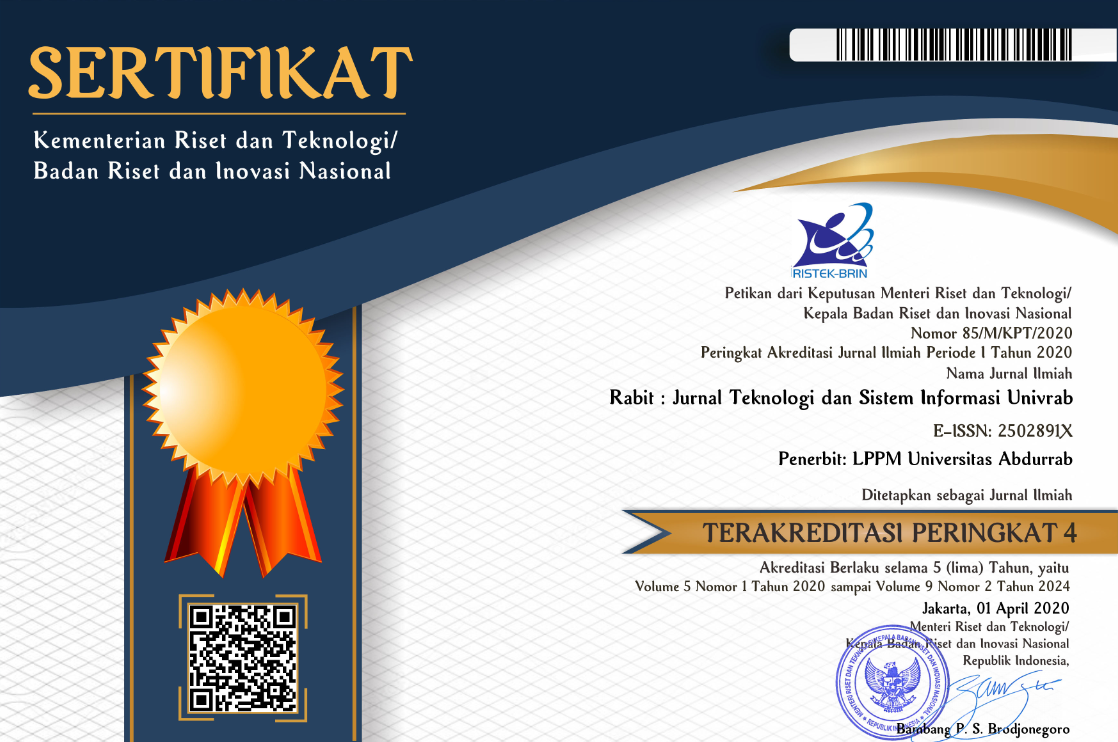ANALISIS FAKTOR YANG MEMPENGARUHI PEMILIHAN GUBERNUR DAERAH KHUSUS JAKARTA MENGGUNAKAN ALGORITMA NAIVE BAYES DAN REGRESI LOGISTIK
Abstract
The election of the Governor and Deputy Governor of the Special Region of Jakarta (DKJ) in 2024 involves the community in determining leaders for the 2024-2029 period. This research analyzes the factors influencing voter decisions using the Naive Bayes algorithm and Logistic Regression. Survey data was collected via a Google Form questionnaire from Jakarta residents aged 17-71. The analysis process involves several stages: problem identification, literature study, data collection, preprocessing, and dividing the data into training and test data. The Naive Bayes algorithm is used to predict classification parameters based on a candidate's education, popularity, and track record, while Logistic Regression predicts factors that influence voter decisions. Naive Bayes shows high accuracy with advantages in speed and processing large data, while Logistic Regression shows strength in binary and multinomial classification analysis. The research results show that the track record factor significantly influences voter decisions. Naive Bayes prediction accuracy reached 85.00% and Logistic Regression 80.00%. The analysis results also reveal that the candidate's popularity and education factors rationally influence voter decisions, although not as strong as the track record. In addition, using these two algorithms provides a comprehensive understanding of voter behavior in Jakarta. Based on these results, governor and deputy governor candidates should also focus on improving their track record and popularity to increase their chances of being elected.
Downloads
References
Tim Detikcom, “Pilgub DKI 2024 Tanggal Berapa? Ini Daftar Tahapannya,” detik.com.
A. S. Fitriani, “JTAM (Jurnal Teori dan Aplikasi Matematika) Penerapan Data Mining Menggunakan Metode Klasifikasi Naïve Bayes untuk Memprediksi Partisipasi Pemilihan Gubernur,” vol. 3, no. 2, pp. 98–104, 2019, doi: 10.31764/jtam.v3i2.995.
M. G. Sadewo, A. Perdana Windarto, I. S. Damanik, S. Tunas, and B. Pematangsiantar, “Prosiding Seminar Nasional Riset Information Science (SENARIS) Algoritma Naïve Bayes Dalam Memprediksi Kepuasan Nasabah,” p. 318, 2019.
B. Purba and R. Syahputra, “Implementasi metode Naive Bayes Classifier pada Evaluasi Kepuasan Mahasiswa terhadap Pembelajaran Daring,” vol. 6, no. 1, 2021, doi: 10.30743/infotekjar.v6i1.4352.
M. I. K. K. and D. S. Hendriyana, “Analisis Perbandingan Algoritma Support Vector Machine, Naive Bayes, Dan Regresi Logistik Untuk Memprediksi Donor Darah,” Jurnal Teknologi Terpadu, vol. 8, no. 2, pp. 121–126, 2022.
Abd. C. Fauzan and K. Hikmah, “Implementasi Algoritma Naive Bayes Dalam Analisis Polarisasi Opini Masyarakat Terkait Vaksin Covid-19,” Rabit : Jurnal Teknologi dan Sistem Informasi Univrab, vol. 7, no. 2, pp. 122–128, Jul. 2022, doi: 10.36341/rabit.v7i2.2403.
I. Muslim, K. Karo, M. Farhan, M. Fudzee, S. Kasim, and A. A. Ramli, “International Journal On Informatics Visualization Karonese Sentiment Analysis: A New Dataset and Preliminary Result,” 2022. [Online]. Available: www.joiv.org/index.php/joiv
I. M. K. Karo, M. F. M. Fudzee, S. Kasim, and A. A. Ramli, “Sentiment Analysis in Karonese Tweet using Machine Learning,” Indonesian Journal of Electrical Engineering and Informatics, vol. 10, no. 1, pp. 219–231, Mar. 2022, doi: 10.52549/ijeei.v10i1.3565.
C. N. Nasution and Y. Widyaningsih, “Klasifikasi Pemilih dalam Pemilu 2019 di Indonesia Menggunakan Regresi Logistik Multinomial dan Chi-Square Automatic Decision Tree (CHAID),” Jurnal Statistika dan Aplikasinya, vol. 6, no. 2, 2022.
R. Prabowo, H. Sujaini, and T. Rismawan, “Analisis Sentimen Pengguna Twitter Terhadap Kasus COVID-19 di Indonesia Menggunakan Metode Regresi Logistik Multinomial,” Jurnal Sistem dan Teknologi Informasi (JustIN), vol. 11, no. 2, p. 366, Jul. 2023, doi: 10.26418/justin.v11i2.57449.
Syahril Dwi Prasetyo, Shofa Shofiah Hilabi, and Fitri Nurapriani, “Analisis Sentimen Relokasi Ibukota Nusantara Menggunakan Algoritma Naïve Bayes dan KNN,” Jurnal KomtekInfo, pp. 1–7, Jan. 2023, doi: 10.35134/komtekinfo.v10i1.330.
E. Novianto, A. Hermawan, and D. Avianto, “Klasifikasi Algoritma K-Nearest Neighbor, Naive Bayes, Decision Tree Untuk Prediksi Status Kelulusan Mahasiswa S1,” Rabit : Jurnal Teknologi dan Sistem Informasi Univrab, vol. 8, no. 2, pp. 146–154, Jul. 2023, doi: 10.36341/rabit.v8i2.3434.
F. D. Pratama, I. Zufria, and T. Triase, “Implementasi Data Mining Menggunakan Algoritma Naïve Bayes Untuk Klasifikasi Penerima Program Indonesia Pintar,” Rabit : Jurnal Teknologi dan Sistem Informasi Univrab, vol. 7, no. 1, pp. 77–84, Jan. 2022, doi: 10.36341/rabit.v7i1.2217.
M. Hasan, “Prediksi Tingkat Kelancaran Pembayaran Kredit Bank Menggunakan Algoritma Naive Bayes Berbasis Forward Selection,” ILKOM Jurnal Ilmiah, vol. 9, p. 317, 2017.
A. Pebdika, R. Herdiana, and D. Solihudin, “Klasifikasi Menggunakan Metode Naive Bayes Untuk Menentukan Calon Penerima PIP,” 2023.
Copyright (c) 2024 Rabit : Jurnal Teknologi dan Sistem Informasi Univrab

This work is licensed under a Creative Commons Attribution-NonCommercial-ShareAlike 4.0 International License.
Copyright Notice
The copyright of the received article shall be assigned to the publisher of the journal. The intended copyright includes the right to publish the article in various forms (including reprints). The journal maintains the publishing rights to published articles. Therefore, the author must submit a statement of the Copyright Transfer Agreement.*)
This work is licensed under a Creative Commons Attribution-NonCommercial-ShareAlike 4.0 International License.
In line with the license, authors and any users (readers and other researchers) are allowed to share and adapt the material only for non-commercial purposes. In addition, the material must be given appropriate credit, provided with a link to the license, and indicated if changes were made. If authors remix, transform or build upon the material, authors must distribute their contributions under the same license as the original.
Please find the rights and licenses in RABIT : Jurnal Teknologi dan Sistem Informasi Univrab. By submitting the article/manuscript of the article, the author(s) accept this policy.
1. License
The non-commercial use of the article will be governed by the Creative Commons Attribution license as currently displayed on Creative Commons Attribution-NonCommercial-ShareAlike 4.0 International License.
2. Author’s Warranties
The author warrants that the article is original, written by stated author(s), has not been published before, contains no unlawful statements, does not infringe the rights of others, is subject to copyright that is vested exclusively in the author and free of any third party rights, and that any necessary written permissions to quote from other sources have been obtained by the author(s).
3. User Rights
RABIT's spirit is to disseminate articles published are as free as possible. Under the Creative Commons license, RABIT permits users to copy, distribute, display, and perform the work for non-commercial purposes only. Users will also need to attribute authors and RABIT on distributing works in the journal.
4. Rights of Authors
Authors retain all their rights to the published works, such as (but not limited to) the following rights;
- Copyright and other proprietary rights relating to the article, such as patent rights,
- The right to use the substance of the article in own future works, including lectures and books,
- The right to reproduce the article for own purposes,
- The right to self-archive the article,
- The right to enter into separate, additional contractual arrangements for the non-exclusive distribution of the article's published version (e.g., post it to an institutional repository or publish it in a book), with an acknowledgment of its initial publication in this journal (RABIT : Jurnal Teknologi dan Sistem Informasi Univrab).
5. Co-Authorship
If the article was jointly prepared by other authors, any authors submitting the manuscript warrants that he/she has been authorized by all co-authors to be agreed on this copyright and license notice (agreement) on their behalf, and agrees to inform his/her co-authors of the terms of this policy. RABIT will not be held liable for anything that may arise due to the author(s) internal dispute. RABIT will only communicate with the corresponding author.
6. Royalties
This agreement entitles the author to no royalties or other fees. To such extent as legally permissible, the author waives his or her right to collect royalties relative to the article in respect of any use of the article by RABIT.
7. Miscellaneous
RABIT will publish the article (or have it published) in the journal if the article’s editorial process is successfully completed. RABIT's editors may modify the article to a style of punctuation, spelling, capitalization, referencing and usage that deems appropriate. The author acknowledges that the article may be published so that it will be publicly accessible and such access will be free of charge for the readers as mentioned in point 3.
 PDF (Bahasa Indonesia)
PDF (Bahasa Indonesia)
 Abstract views: 35
Abstract views: 35
 downloads: 18
downloads: 18

 :
:












